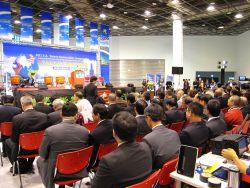On December 10-12, 2012, U.S. EPA and our sustainable ports and goods movement partners hosted the Promoting Sustainable Ports in the Asia Pacific Region forum in Kaohsiung, Taiwan. The forum launched an initiative to:
Representatives from international marine ports, environmental authorities, cities, industry, academia, and non-governmental organizations shared approaches to achieve economic, environmental, community and human health sustainability.
Throughout the forum, experts addressed topics such as air emissions and air quality, health impacts, cleaner energy, energy and operational efficiency, technology, urban planning, and community and ecosystem benefits. Partners from Kaohsiung, Taipei, Hong Kong, Indonesia, Japan, and the U.S. participated in this initial forum.
The forum consisted of six sequential sessions.
This forum broadened the network of experts and created the foundations of the Ports Sustainability Collaborative which will be further advanced in 2013.
Session 1: Sustainability for marine ports, vessels and goods movement
Objective: Define the necessary elements for comprehensive strategies to achieve port, marine vessel and goods movement sustainability, including: common themes amongst global ports that lead to environmental and human health protection, sustainable economic growth and port community and ecosystem benefits.
Setting the context for defining sustainability
Dennis McLerran, US EPA Regional Administrator, EPA Pacific Northwest Region
Strategies for Sustainable Ports
Lisa Wunder, Assistant Air Quality Supervisor, Port of Los Angeles
Planning and Implementation of Air Pollution Control Strategies for Major Ports in Taiwan
Dr. S.C. Chuang, Senior Specialist, Department of Air Quality Protection and Noise Control, Taiwan Environmental Protection Administration
The New Era for Kaohsiung Port
David Chien-Yu Cheng, Harbor Master, Port of Kaohsiung, Taiwan International Ports Co., M.O.T.C.
Evergreen Line’s Green Ship Operations
Patrick Lin, Executive Vice President, Marine Division, Evergreen Marine Corp, (Taiwan) Ltd.
Session 2: Port City Human Health and Environment
Objective: Representatives share research on port and marine vessel related health and environmental impacts and applied examples of successful port strategies resulting in air quality and other environmental improvements.
From Science to Policy: Ship Emissions Control Strategy in Hong Kong and the Pearl River Delta
Opening Speaker and Moderator: Simon Ng, Head of Transport and Sustainability Research, Civic Exchange
Green Freight and Healthy Supply Chains
Dr. James Corbett, University of Delaware, School of Marine Science & Policy
Overview of Impacts of Emissions from Ports, Marine Vessels and Goods Movement in the U.S.
Dennis McLerran, US EPA Regional Administrator, EPA Pacific Northwest Region
Quarantine of International Port in Taiwan
Chang Chao-Ching, Branch Director, Taiwan Department of Health Center for Disease Control, Kaohsiung
Health Impact Assessment of Marine Emissions in the Pearl River Delta Region
Dr. Hak Kan Lai, Hong Kong University, Department of Community Medicine, School of Public Health
Session 3: Successful Examples of Sustainability Strategies and Practices
Objective: Present results of successfully implemented port, shipping and goods movement sustainability strategies and practices, including: reductions in air pollution and greenhouse gas emissions, cleaner energy and energy efficiency, operational efficiencies, cost savings, advancements in technology and improvements in community engagement, public health and quality of life.
Moderator: Penelope McDaniel, Environmental Scientist and Lead U.S. West Coast Collaborative, U.S. EPA
Port of Los Angeles Air Quality and Technology
Kevin Maggay, Air Quality Supervisor, Port of Los Angeles
Port of Tacoma Sustainable Habitat Stewardship Program
Jason Jordan, Environmental Director, Port of Tacoma
Taiwan Greening the Ports
Ting-Yi Tsai, Vice President of Business, Taiwan International Ports Co., Ltd.
Successful Examples of Sustainability Strategies and Practices
T.C. Chen, President, Kao Ming Container Terminal Corp., Port of Kaohsiung
Maersk Line’s sustainability strategies and practices in the Asia Pacific Region and Beyond
Anthony Randell, Managing Director of Business, Maersk Taiwan
Session 4: Capacity to Develop, Plan and Implement Sustainable Port Practices
Objective: Provide an overview and examples of institutional capacity needed for port environmental and economic sustainability, and social responsibility, factoring in voluntary and regulatory measures and broad collaborative efforts.
Building Institutional Capacity for Port and Environmental Sustainability
Richard Sinkoff, Director, Environmental Programs & Planning, Port of Oakland
Presentation followed by a panel discussion
Session 5: Highlight Global Practices and Opportunities to Advance Sustainable Ports, Shipping and Goods Movement
Objective: Present port, shipping and goods movement practices that have global reach, with multi-port, port city, and industry benefits, including: environmental, economic, community and ecosystem sustainability.
Overview on Actions to Reduce Shipping Emissions
Moderator & Opening Remarks: Dr. Nic Lutsey, Program Director of Goods Movement, International Council for Clean Transportation
Sustainable Good Movement: Global Practices and Opportunities
Stephanie Jones-Stebbins, Director, Seaport Environmental and Planning, Port of Seattle
Best Practices to Reducing Air Emissions from Shipping and Ports
Freda Fung, International Council for Clean Transportation
Optimization of the Ship Routes with the Aid of Numerical Ocean Current Prediction Models
Dr. Jason C.S. Yu, Assistant Professor, Department of Marine Environment and Engineering Center for Water Resources Research, National Sun Yat-Sen University
Session 6: Working Together to Advance Regional and Global Sustainability of Goods Movement
Objective: Explore accomplishments, challenges, and how to further cross-Pacific collaboration and achieve consistent/complementary sustainability approaches.
Wrap-Up, Open Discussion, and Next Steps
Presenters and Moderators: Penelope McDaniel, Environmental Scientist and Lead U.S. West Coast Collaborative, U.S. EPA & Lisa Wunder, Assistant Air Quality Supervisor, Port of Los Angeles
Closing Remarks
Dennis McLerran, US EPA Regional Administrator, EPA Pacific Northwest Region
U.S. EPA
U.S. EPA – Region 9

